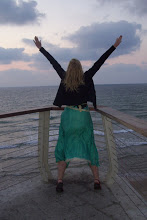As I get older, one of the most repeated sentiments I notice is “I don’t want to grow up. I still feel fifteen.” I don’t agree, and don’t think I ever have. Adulthood is all of me there is; if there was ever a child, she died yearning to be taken seriously. Some of her immaturity may flash to the surface every so often; her jealousy, judgment, petulance, or pickiness bubbles up maybe more often than I’d like, but I’m used to pushing down her ill-defined ghost in favor of logic, my new muse. My decisions are rational, legal, and always thought through. I wear contact lenses, and ironically, the prescription on my box tells me I’m nearsighted. In reality, I’m almost painfully hyperopic, used to forcing my life’s stream through a pinhole to achieve ends that won’t pay off for years. I don’t play or joke or even laugh gratuitously. I’m quiet when someone else is talking, and I’ve never understood those who continue conversations in flagrant disregard for words someone else has prepared. I like to think it’s because I respect a speaker's ideas, but maybe it’s because I have nothing to say, which is not uncommon. I’ve become used to allowing my opinions to occupy only the confines of my sulci, and where I used to challenge or debate I now murmur and accept. I allow others to keep their own opinions, even when I know they’re wrong. I don’t step in to correct; I simply don’t care whether they’re wrong anymore. I know they’re wrong, but don’t care enough to defend the fact that I’m right. I could produce a textbook page, quote Herodotus—shut them down with a pillar of fire, but I don’t. I think I’m simply sick of self-promotion.
Even here, people search me out because they’re bubbling over and know I’m skilled at catching the overflow. If I were to pick a life theme, this would be it: because I don’t speak, I listen. It’s not a choice, it’s a default option I’ve learned to run with. I used to wait for moments in conversation when I could contribute, where I could offer a story or comment to let the world know I was me. Now I let my work ethic speak for itself. If others want to know me, they can examine what I produce, because in all honesty, I’m not much more. I’ve met 79 classmates here in Jerusalem. Time and time again, we introduced ourselves to each other. I’m fine with questions that have an answer. Where are you from? What do you study? What’s the composition of your family? It’s the others that get me. Tell an interesting fact about yourself. I have around five pithy comments I keep on hand for just such an occasion, but here, they exhaust themselves all too quickly and I am left to reconcile myself with my own empty shell, superspecialized already. The list of things I do is embarrassingly short. I maintain a perfect GPA. I do lab research. I fall into bed exhausted every night after short exchanges with my roommates. Sometimes I participate in social events, but the few I select come infrequently. How, then, am I to explain my life in just a few casual sentences? I could tell them about my research, and maybe at one point I would have done so, but the comfortable ruts of technical vocabulary I would fall into are grounds for alienation. I could tell them the truth, that I live in my test tubes and books, but then I sound absolutely un-friend-able. Telling them my ambitions sounds pretentious and unfounded; telling them I can water-ski and wakeboard sounds fake. So instead I say nothing. Instead, I revert to an almost seventh-grade self-consciousness. Back then, I knew the middle school gossip queen, and I saved up until I had twenty dollars to bribe her with so I could get some idea of how other people saw me. I’m grateful I never got up the guts to give her the money. At that point, I may not have recovered. I remember one day in ninth grade, when I asked my friend to be perfectly honest about where I fell on the spectrum of fourteen-year-old looks. “Well, you’re not pretty, but you’re not, like, incredibly ugly,” she told me, and I thanked her for her honesty.
I’ll end quoting Adah Price from Barbara Kingsolver’s The Poisonwood Bible: “Silence has many advantages. When you do not speak other people presume you to be deaf or feeble-minded and promptly make a show of their own limitations. Only occasionally do I find I have to break my peace: shout or be lost in the shuffle. But mostly I am lost in the shuffle. I write and draw in my notebook and read anything I please. It is true I do not speak as well as I can think. But that is true of most people, as nearly as I can tell.”
Welcome.
안녕하세요!
مرحبا عليكم!
I study languages.
Saturday, May 30, 2009
Subscribe to:
Post Comments (Atom)


No comments:
Post a Comment